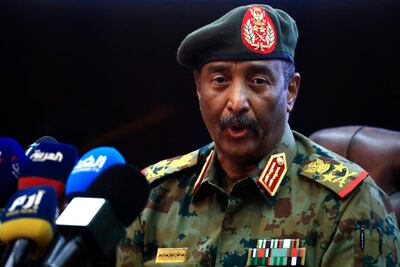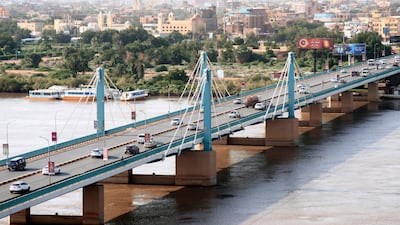Sudan’s military rulers have reopened the capital’s Nile bridges but thousands of troops and allied militiamen remained stationed throughout Khartoum on Monday in anticipation of more protests against the October 25 takeover.
The internet has remained cut off since the takeover, while telephone services, disconnected during Saturday’s mass protests, have been mostly restored. Shops, banks, government offices, schools and universities remain closed as part of a civil disobedience campaign that entered its second week on Monday.
Doctors, teachers, pharmacists and civil aviation employees are among professional unions on indefinite strike since last week.
Sudan's army chief, Gen Abdel Fattah Al Burhan, who has removed several officials from their posts since the takeover, fired the country's chief prosecutor on Sunday.
It was not immediately clear whether the sacking of the chief prosecutor was linked to the surprise release from prison and re-arrest of at least seven politicians loyal to former president Omar Al Bashir.
Al Bashir was ousted by his generals in April 2019 after months of mass street protests against his 29-year rule.
The seven politicians include Ibrahim Ghandour, a former foreign minister and chairman of Al Bashir's once-ruling National Congress Party, as well as his deputy Anas Omar.
The seven were released on Sunday and returned to prison on Monday. Their release had given rise to speculation that the takeover's leaders might be willing to gift Al Bashir regime loyalists a political role or at least ease the pressure put on them by the civilian-led government the army deposed last Monday.
Gen Al Burhan has already suspended a state commission mandated by that government to dismantle Al Bashir's legacy, purging his loyalists from the bureaucracy, the army and security agencies. The general said the commission's methods needed to be revised.
Pedestrians and motorists in Khartoum had been prevented by soldiers from crossing the bridges connecting the city’s three boroughs – Khartoum, umm Durman and Khartoum Bahary – in a bid to stifle mass protests.
It did not stop hundreds of thousands taking to the streets in Khartoum and across Sudan to denounce the takeover and demand a return to the transition to democratic rule.

At least three people were shot dead by soldiers in Saturday’s protests, with more than 100 injured. The deaths took to 12 the number of protesters who have died since last Monday’s takeover. The number of injured now stands close to 300.
Meanwhile, Britain – Sudan's former colonial ruler – said on Monday it had requested that the UN Human Rights Council convene an emergency session.
The request was sent to the president of the 47-member Geneva forum on behalf of 18 member states, more than the one third required to convene a special session. It was backed by 30 countries with observer status, including the US.
"The actions of the Sudanese military are a betrayal of the revolution, the transition and the hopes of the Sudanese people," Simon Manley, Britain's ambassador to the UN in Geneva, said in a tweet.
The UN envoy to Sudan on Monday described intensive efforts to mediate between the military leaders who staged last week’s coup and civilian leaders, saying a new power-sharing plan could be revealed within days.
Speaking via video link from Khartoum, UN envoy Volker Perthes described a “lot of shuttling” between Gen Al Burhan, Mr Hamdok and others over the weekend.
Gen Al Burhan has dismissed the civilian-led government, arrested ministers, politicians and important activists and dissolved a joint civilian-military council that operated as a collective presidency and was chaired by him. He also announced an indefinite state of emergency and sacked provincial governors.
The general, a one-time Al Bashir favourite, sacked at least six ambassadors to vital foreign capitals, along with the heads of the official news agency and state television. The military takeover, said Gen Al Burhan, saved the country from civil war, a claim he has not backed up.

A tribal group announced on Monday it would temporarily lift a six-week blockade on Sudan's main seaport following a deal with the military.
Opponents of the takeover had accused the army of engineering the blockade of Port Sudan to put pressure on civilian leaders and justify plans to end their rule. The army has denied being behind the blockade and declined to get involved, saying it was based on legitimate demands.
Barricades at the port and on the main road to Khartoum were being lifted from Monday morning for a month, said Abdallah Abushar, secretary for the High Beja Council, which imposed the blockade in September.
Members of the Beja tribal group had shut the Red Sea port in September to press a wide range of demands, including the replacement of the civilian-led government.
The takeover has sparked daily protests, with demonstrators and soldiers fighting pitched street battles. The protesters pelt the soldiers with rocks, burn tyres and block streets with bricks or large slabs of concrete, while the military responds with teargas, rubber bullets, live rounds and beatings.
One week on and there appears to be no end in sight for the stand-off between civilians and the military. The generals are not showing any signs of reversing their course and allowing the transition to democratic rule to proceed.
UN Secretary General Antonio Guterres on Sunday called on the Sudanese military to reverse their takeover of the country. Military leaders, he said, should take heed of Saturday’s protests.
“Time to go back to the legitimate constitutional arrangements,” he wrote on Twitter, referring to a power-sharing deal that established joint military-civilian rule after the removal of Al Bashir and his government in 2019.
The coup has triggered strong international condemnations, with the United States and the World Bank suspending hundreds of millions of dollars in aid and the European Union likely to follow suit.


